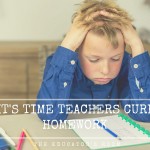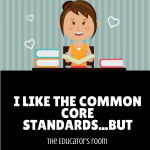 I admit becoming a parent made me more aware of what I loved and feared in education. I went through an intense stage of self awareness when my daughter entered kindergarten. Her excitement to learn was attributed to her teacher with 30+ years experience who was engaging, entertaining and organized. Transformation in my own teaching came from simple practices that she modeled. This teacher communicated with parents, gave every interested parent a role to play in or outside the classroom and setup routine lessons as the framework for widely interpreted home practices.
I admit becoming a parent made me more aware of what I loved and feared in education. I went through an intense stage of self awareness when my daughter entered kindergarten. Her excitement to learn was attributed to her teacher with 30+ years experience who was engaging, entertaining and organized. Transformation in my own teaching came from simple practices that she modeled. This teacher communicated with parents, gave every interested parent a role to play in or outside the classroom and setup routine lessons as the framework for widely interpreted home practices.
In the Journal for the Education of the Gifted (2009), Craig Howley urged schools to avoid being tied to middle class or corporate values. In rural areas, like my own, “the community students belong to is of immeasurable consequence to their education”. Teachers can embed cultural ideals into the coursework but until work at home counts as meaningful education at school, we will have communities at odds. It isn’t surprising to find parents airing frustrations on Facebook or in other public forums when home life is at odds with schools. Standardized testing has caused communities to look suspiciously at methodology as reasons for failing students of race, ethnicity, and socioeconomic status. Educators retort that parents and social entities promote the values in school which cause us to miss the talents of one group of students over another. However, this cycle can be avoided when parents and teachers invest in partnerships to promote learning.
- Higher scores on standard tests are influenced more by home environments with a greater access to literacy activities. In a search for transformative approaches to curriculum, research identifies positive implications for learning when teachers validate choice activities bridging home and school literacy. (Ying, Klinger, Living, Fox, &Doe,2011).
- Do home activities include traditional literacy?- writing notes or directions, reading newspapers, manuals and instructions, religious or spiritual pieces, comics or magazines? Varieties of genres lead to more opportunity for comprehension and discovery of a text that makes sense to a learning style.
- Do family members model traditional literacy? Engaging everyone in activities during schoolwork time at home creates communal value for gaining knowledge. Younger students benefit when family members are seen learning new words, using dictionaries manipulating sounds. (phonological awareness,) Even correcting the wrong use of a word is invaluable. Children need to know that we learn from mistakes. (emergent literacy)
- Do households and families engage in creative literacy activities? Reading fiction, poetry, singing lyrics, writing lyrics, poetry, letters. Do families write and share short stories? Just one variable has a loading of .50 which means is considered highly influence comparative to other literary practices. (Ying, et al).
- Do households promote fluency in a second language? A school sampling of 143 students who reported fluency in another language engaged in creative and traditional literacy activities in both languages. (Ying, et al)
- Literacy activities are not confined to books and print on paper. The variety of ever-changing tech tools: Reading websites, email, chat-rooms and text messaging build minimal levels of learning. Real learning accelerates when students engage in collaborative editing, converting complex ideas to simple twitters, interactive gaming, application design and intertextual overlays- (comparing books to internet searches.)
- Model chunking. Breaking down difficult information into segments builds self connections. Working with non-continuous text: bills, applications, schedules are useful to model.
- Do students receive credit for making connections between their texts and their own practices? I learned about ratios when I mixed my own oil/gas for our lawn mower. Politics made sense when I attended my first rally. Parents can work with teachers to credit valuable activities.
- Quantitative literacy is authentic. Balancing budgets, computing designs, cataloguing collections is definitive literacy that needs practice.
- Can students read and explain informational text? The National Reading Panel (2000) contends that most students have few experiences reading informational texts and lack strategies that students need when reading textbooks. I disagree. Students gain information in multiple courses daily and are asked to apply newly learned concepts to material. Frustrations stem from too much information and insufficient time to practice (Willingham, 2009). Teachers and communities need work together to set learning pace, find authentic opportunities and resources for repetitive practice.
How we learn and what we learn is influenced by many variables but assuredly, routine practices at home and school become the assembling blocks for critical thinking. According to the National Center for Educational Statistics, about 22% of American adults have minimal literacy skills. This means that they can read some words but not enough to understand simple forms or instructions. While this particular study was meant to cause a riff between education and community it made me consider the veteran kindergarten teacher. Her value for what families could provide and for how children learn in the home piqued interest and invited learning in a rich context. Every single child brought in a homemade robot for the year’s end assessment. Education should not be confined to four walls if parents can be purposeful, if educators rebuild that relationship.
Howley- https://sites.google.com/site/howleycb/peer-reviewedarticles
phonological-http://www.doe.virginia.gov/instruction/response_intervention/resources/ideas_activities_develop_phonological.pdf
emergent literacy- http://www.mothergooseprograms.org/literacy_research.php
Willingham- http://www.danielwillingham.com/articles.html
NPR puzzle- http://www.npr.org/series/4473090/sunday-puzzle
References:
Howley, C. (2009). The meaning of rural difference for bright rednecks. Journal for the Education of the Gifted, 32(4), 537-564. (prepublication version)
The National Institute For Literacy. (2008) Caliteracy.org. retrieved from the internet, August, 31, 2012.
National Reading Panel(NRP). (2000). The report of the National Reading Panel: teaching children to read, at a hearing before the U.S. Senate Appropriations Committee’s Subcommittee on Labor, Health and Human Services, and Education. Retrieved from www.nationalreadingpanel.org.
Willingham, D. T. (2009). Why don’t students like school?: a cognitive scientist answers questions about how the mind works and what it means for the classroom. San Francisco, CA: Jossey-Bass.
(Ying, Z.,Klinger, D.A., Living,C., Fox,J., &Doe,C.(2011). Test-Takers’ Background, Literacy Activities and Views of the Ontario Secondary School Literacy Test. Alberta Journal of Educational Research, 57(2). 115-136. )





Students can be easily frustrated with the overload of work. According to some researches, the way of teaching will change completely in the upcoming years. There will be lot of new things which would get introduced to relieve the mental stress and physical burden of young students. Parent Teacher partnership is essential to understand about the student in a better way.